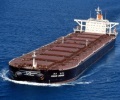

The Baltic Exchange’s dry bulk sea freight index extended losses for a seventh straight session on Monday, as a drop in capesize rates offset gains in the smaller vessel segments.
The overall index, which factors in rates for capesize, panamax, supramax and handysize vessels, fell by 122 points, or 2.5%, to 4,732.
The capesize index fell 409 points, or 5.3%, to 7,358, its lowest since Sept. 22.
Average daily earnings for capesizes, which transport 150,000-tonne cargoes such as iron ore and coal, fell $3,391 to $61,026.
Despite the fall in spot rates for capesizes last week due to a slow down in iron ore demand and “cargo splitting”, coal trade is expected to remain robust for all dry bulk carriers, brokerage Jefferies said in a weekly note on Monday.
China’s coking coal and coke futures jumped about 9% to record highs, as supply remains tight even though Beijing has ramped up efforts to boost output.
Jefferies further observed that the 2022 forward freight agreement (FFA) for capesizes has strengthened over the past few weeks.
Forward freight agreements allow ship owners and contractors to manage freight risk against volatility.
The panamax index added 26 points, or 0.6%, to 4,091, its highest in over three months.
Average daily earnings for panamaxes, which ferry 60,000-70,000 tonne coal or grain cargoes, increased by $234 to $36,818.
The supramax index added 19 points to an all-time high of 3,595, according to Refinitiv Eikon going back until 2017.
Source: Reuters (Reporting by Kavya Guduru in Bengaluru; Editing by Ramakrishnan M.)